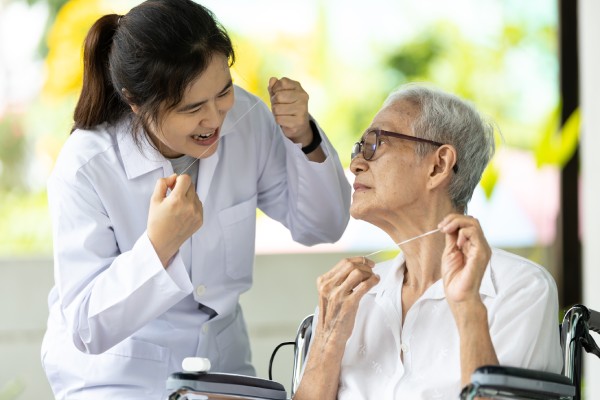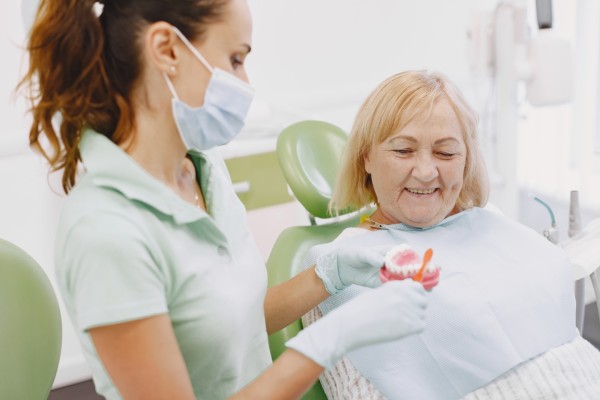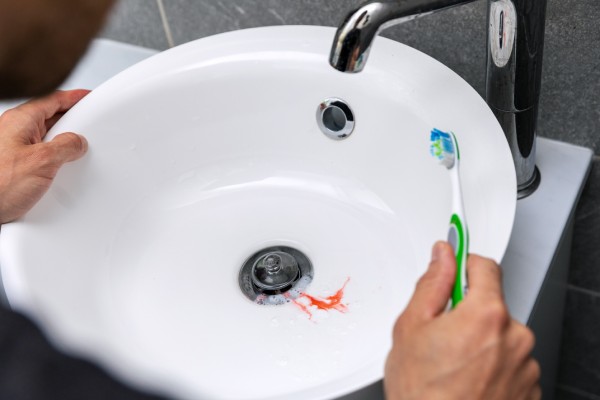Special Considerations for Oral Health in the Elderly Population
Good oral health is crucial for the overall health and well-being of older individuals, especially those with complex or chronic health conditions. Unfortunately, the importance of dental care for the elderly is often overlooked.
Our caring team is dedicated to ensuring that older individuals receive excellent dental care. One of the biggest ways we do this is by providing mobile dentistry care to individuals who would otherwise be unable to travel to a traditional dental clinic.
What Oral Health Issues Do Older Individuals Face?
The major issues affecting the oral health of older individuals are:
- Increased prevalence and severity of periodontal disease (gum disease)
- Dry mouth
- Loss of teeth
- Filling breakdown
- Dental decay
- Inequity of access to dental care
- The negative effects of chronic health conditions and medications on oral health
- Pain or difficulty eating resulting in poor nutrition
- Health problems as a result of denture, gum, or teeth issues

Treating and Preventing Dental Decay and Gum Disease In Elderly Patients
Dental decay is widespread in Australia, including among the elderly population. It is caused when poor oral hygiene allows plaque — a sticky film containing a wide variety of bacteria — to build up on the teeth. The bacteria found in plaque then interferes with sugars and creates acids that destroy the tooth’s outer layer (enamel).
Gum disease is a condition caused by the bacteria found in plaque. Gum disease irritates the gums, causing them to be red, swollen, and even bloody at times. With age, gum disease becomes more prevalent and increases in severity.
Gum disease is widespread as it is often painless until the advanced state. Left untreated, gum disease can cause the gums to pull away from the teeth, creating deep pockets for food particles and plaque to collect. In the advanced stage, gum disease can destroy the bone, ligaments, and gums and lead to tooth loss.
Regular dental visits are imperative for treating and preventing gum disease and dental decay in elderly patients. For patients in aged care facilities or nursing homes, or patients with mental or physical conditions or limitations, dental care used to be difficult or impossible to obtain. Fortunately, our team’s specialised knowledge and advanced equipment enables us to provide mobile dental care that is equivalent to a traditional dental office.

Habits For A Healthy Mouth
Along with receiving regular, comprehensive dental exams, healthy habits are important for preventing dental decay and gum disease. These oral health habits include:
- Limit sugar intake and limit how frequently sugary foods or drinks are consumed
- Limit acidic foods
- When consuming sugar, do so at meal time when saliva production is highest
- Practice correct brushing and flossing technqiues
- Avoid excessive horizontal brushing or harsh brushing
- Use a toothpaste containing fluorde
The Role of Saliva In Dental Disease In Older Adults
Saliva acts as a significant protection mechanism for the teeth and overall oral structure. Older individuals can experience difficulty maintaining adequate saliva levels.
Persistent dry mouth is a common symptom of a number of pharmaceuticals. This makes it imperative to tell your dentist any medications you are taking.
In order to best care for the oral health of elderly individuals, it is important to:
- Increase awareness surrounding the importance of saliva and oral health
- Know the side effects of dry mouth
- Be aware if a medication puts an individual at risk of dry mouth (over 500 medications include dry mouth as a side effect, including prescriptions for asthma, high blood pressure, allergies, high cholesterol, Alzheimer’s, and more)

The Link Between Medications and Cavities
Do you find yourself getting more cavities as you get older? Or have you noticed an elderly loved one experiencing an increase in the number of cavities they get?
As age increases, so do the odds of getting cavities. Dry mouth is a significant factor behind this second round of cavity-prone years.
Your dentist can work with you to make recommendations to help reduce dry mouth symptoms and prevent dental decay.
Here are some common recommendations for protecting the mouth against dryness and decay:
- Consult with your physician to see if a medication needs to be changed or if the dosage needs to be adusted
- Increase the amount of water you drink (carry a water bottle with you and stay hydrated by drinking before you even get thirsty)
- Use lozenges or sugar-free gum to stimulate the production of saliva
- Moisten the air with a humidifier
- Avoid beverages or foods that further irritate a dry mouth (alcohol, acidic fruit juices, soft drinks, coffee)
- Use over-the-counter oral moisturizers, spray, or mouthwash
- Ask your dentist if a fluoride gel or varnish would be appropriate for your teeth
Mouth Cancer
Over 1,000 cases of mouth or tongue cancer are diagnosed in Australia each year. One of the risk factors is older age. In the early stages, oral cancer does not typically cause pain, making dental checks for older individuals extremely important.
Risk for mouth and tongue cancer include:
- Smoking tobacco, including pipes, cigars, and cigarettes
- Chewing or smoking betel nut, pan, gutka, or areca nut
- HPV (human papillomavirus) infecton
- Being overweight or obese
- Being over the age of 40
- Being male
- Having a child, sibling, or parent with head or neck cancer
- Drinking alcohol
- Breathing in certain chemicals or paints
- Having a weakened immune system
- Breathing in wood dust, dry cleaning solvents, or asbestos fibres
Helping A Disabled Or Elderly Loved One If You Are Their Caregiver
If act as a caregiver for a spouse, friend, or parent and they are experiencing difficulty maintaining a healthy mouth, there are ways to help:
- Help your loved ones keep their mouth clean by reminding them to brush and floss daily or helping them with their oral care routine.
- Make sure your loved one receives regular dental exams.
- If your loved one is experiencing difficulty brushing and flossing, ask your dentist for tips or different approaches to try.
- For individuals with dentures, watch their eating habits closely to make sure they are not experiencing difficulty eating or are showing a change in eating habits.
- If your loved one is confined to a bed, ensure they still receive regular dental care.

Do You Need Dental Care For An Elderly Loved One?
Older individuals, especially those in aged care facilities or nursing homes, need regular dental exams to ensure their teeth and mouth remain healthy.
With a devotion to Aged Care Dentistry and the unique abilities of our mobile dental clinics, our team is skilled at providing quality dental care to individuals that may otherwise go without treatment.
With advanced mobile technology, the latest equipment, years of experience working with individuals with cognitive, medical, or behavioural conditions, our talented, caring team is here to make sure dental care is available to everyone.